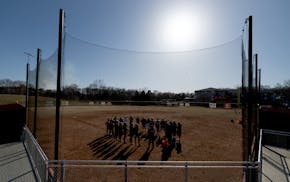ROCHESTER – For the past two years, cities in Olmsted County could shut down proposals for undeveloped land before county officials could ever weigh in.
The city of Rochester liked it that way, arguing it should have a say in how future city land gets developed. Olmsted officials disagreed, arguing Rochester could be overreaching its interest.
The Olmsted County Board put the issue to rest this month, amending its land use planning process once more to have the final say over proposed projects on land outside city or township limits. Commissioners approved the amendment 6-1 on Dec. 17 over Rochester officials' protests.
"I don't know of any county commissioner that wants to harm the city of Rochester's ability to grow in a responsible manner," Commissioner Mark Thein said. "We just want to do the same job we've been doing for 47 of the last 49 years."
Counties and cities often lay out future plans for undeveloped land within their borders, with larger cities accounting for land just outside their limits — called urban service areas — that may one day be annexed so they can figure out how to install sewer services and other city infrastructure.
Olmsted County's general land use plan takes a similar approach, laying out potential uses for land outside city or township limits over several decades into the future.
Olmsted and Rochester have worked together on the county plan since the late '70s — Rochester has been the county's largest city for decades and occupies most of Olmsted County today. Yet Rochester and nearby townships have fought over planning rights for some time, with the townships at one point banding together to form their own planning group.
Rochester split off from the county in 2019 to start its own planning department. But issues didn't crop up until 2022, when the county updated its land use plan once again. That's when a new rule came up: If a planning proposal came up for land that could one day have city infrastructure or utilities, cities and townships within Olmsted could torpedo the proposal before it ever reached the county.
"If the city didn't approve it, the county never saw it," Thein said.
County staff put the rule in at commissioners' requests to streamline the planning process, but it's had unintended consequences.
Township officials complained to Olmsted staff earlier this year over Rochester's outsized role, prompting a monthslong review of the county's current planning process.
The change likely won't affect many proposals. Planning director Dave Dunn told commissioners the county has received only three requests to change Rochester's urban service area over the past decade. Other proposals included housing projects that would have used private septic systems rather than Rochester sewer services, which some townships embraced though Rochester didn't as it would have conflicted with its future growth plans.
Rochester officials say they're concerned the county could make housing construction more expensive for everyone moving forward, as well as harm relations between the two governments.
"I worry that your decision to remove the city's role in the land use policy jeopardizes this partnership and negatively impacts the great progress we have made together," Mayor Kim Norton wrote in a memo to county commissioners earlier this month.
Rochester Council Member Norman Wahl went before commissioners to lobby against the change, arguing that amending the rule would make development harder and potentially bring more environmental risks if the city can't properly hook up properties to sewer systems.
He and other city officials wanted more time to hammer out details and find common ground.
"We believe that decisions that encumber city finances belong with the city," Wahl said.
Commissioner Dave Senjem, the lone dissenting voice on the issue, agreed Rochester should have more say in its future boundaries to manage community growth.
"We have to think long-term about this," Senjem said. "We have to think in terms of what the city is going to look like beyond any of us."

Golden Valley highway crash leaves one man dead; suspect in custody
Semi kills 10 cows on southeastern Minnesota highway
In South Carolina, Walz says Democrats 'need to change the attitude'
Two injured in shooting outside University of Minnesota arena after high school graduation

